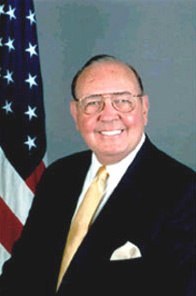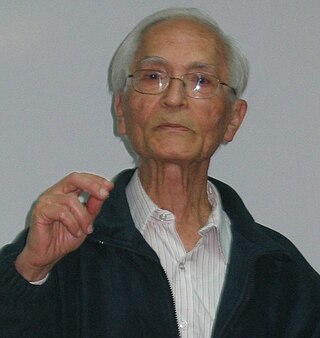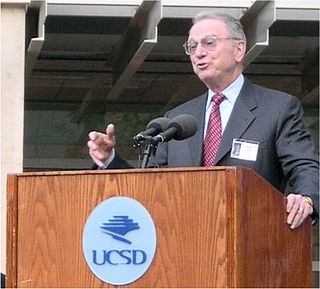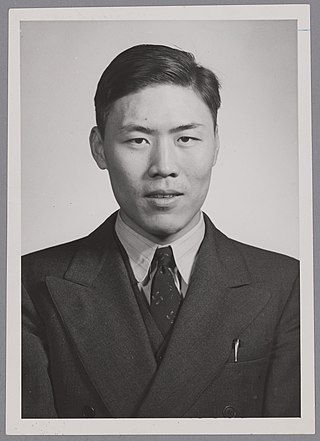Related Research Articles

Electrical engineering is an engineering discipline concerned with the study, design, and application of equipment, devices, and systems which use electricity, electronics, and electromagnetism. It emerged as an identifiable occupation in the latter half of the 19th century after the commercialization of the electric telegraph, the telephone, and electrical power generation, distribution, and use.

Elwyn Ralph Berlekamp was a professor of mathematics and computer science at the University of California, Berkeley. Berlekamp was widely known for his work in computer science, coding theory and combinatorial game theory.

Richard John Egan was an American business executive, political fundraiser, and United States Ambassador to Ireland (2001–2003).
Suhas S. Patil is an Indian-American entrepreneur, academic, and venture capitalist. He founded Cirrus Logic, a fabless semiconductor company. Patil's work has covered computer architecture, parallel processing computers, very-large-scale integration devices, and integrated circuit design automation software. He also serves on the boards of The Tech Museum and the World Affairs Council of Northern California. He is known for describing the "cigarette smokers problem" for concurrent computing in 1971.

Jacob Ziv was an Israeli electrical engineer and information theorist who developed the LZ family of lossless data compression algorithms alongside Abraham Lempel.
Thomas Kailath is an Indian born American electrical engineer, information theorist, control engineer, entrepreneur and the Hitachi America Professor of Engineering emeritus at Stanford University. Professor Kailath has authored several books, including the well-known book Linear Systems, which ranks as one of the most referenced books in the field of linear systems.

Irwin Mark Jacobs is an American electrical engineer and businessman. He is a co-founder and former chairman of Qualcomm, and chair of the board of trustees of the Salk Institute. As of 2019, Jacobs has an estimated net worth of $1.2 billion.
Paul Edward Gray was the 14th president of the Massachusetts Institute of Technology. He is known for his accomplishments in promoting engineering education, practice, and leadership at MIT and in the world at large.

John Vogel Guttag is an American computer scientist, professor, and former head of the department of electrical engineering and computer science at MIT. He conducts research on computer networks and medical applications of AI as co-lead of the MIT Computer Science and Artificial Intelligence Laboratory's Networks and Mobile Systems Group.
John Spencer MacDonald, was a Canadian engineer, businessman, and academic. He was co-founder of MacDonald, Dettwiler and Associates (MDA), an aerospace, information systems, and technology company. MacDonald served as the chancellor at the University of Northern British Columbia from 2010 through 2016.

Uncas Aeneas Whitaker was a prominent mechanical engineer, electrical engineer, lawyer, entrepreneur, and philanthropist. Raised in Missouri, he received a mechanical engineering degree at the Massachusetts Institute of Technology, an electrical engineering degree from Carnegie Institute of Technology and a law degree from the Cleveland Law School. At the age of 41, he founded Aircraft-Marine Products, AMP Incorporated, in Harrisburg, Pennsylvania, which would become the world's largest manufacturer of electrical devices and connectors. His company was instrumental in the development of miniature components and advanced computer technologies which have been incorporated into thousands of business operations and commercial products.
Gordon Stanley Brown was a professor of electrical engineering at MIT. He originated many of the concepts behind automatic-feedback control systems and the numerical control of machine tools. From 1959 to 1968, he served as the dean of MIT's engineering school. With his former student Donald P. Campbell, he wrote Principles of Servomechanisms in 1948, which is still a standard reference in the field.

Stuart E. Madnick is an American computer scientist, and professor of information technology at the MIT Sloan School of Management and the Massachusetts Institute of Technology school of engineering. He is the director of Cybersecurity at MIT Sloan (CAMS), formerly called the MIT Interdisciplinary Consortium for Improving Critical Infrastructure Cybersecurity ( ³).

Gene F. Franklin was an American electrical engineer and control theorist known for his pioneering work towards the advancement of the control systems engineering – a subfield of electrical engineering. Most of his work on control theory was adapted immediately into NASA's U.S. space program, most famously in the control systems for the Apollo missions to the Moon in 1960s–1970s.

Dugald Caleb Jackson was an American electrical engineer. He received the IEEE Edison Medal for "outstanding and inspiring leadership in engineering education and in the field of generation and distribution of electric power".

Stanley Zdonik is a computer scientist specializing in database management systems. He is a tenured professor of computer science at Brown University. Zdonik has lived in the Boston area his entire life. After completing two bachelor’s and two master's degrees at MIT, he then earned a PhD in database management under Michael Hammer.
David Luckham is an emeritus professor of electrical engineering at Stanford University. As a graduate student at the Massachusetts Institute of Technology (MIT), he was one of the implementers of the first systems for the programming language Lisp.

John George Trump was an American electrical engineer, inventor and physicist. A professor at the Massachusetts Institute of Technology (MIT) from 1936 to 1973, he was a recipient of the National Medal of Science and a member of the National Academy of Engineering. Trump was noted for developing rotational radiation therapy. Together with Robert J. Van de Graaff, he developed one of the first million-volt X-ray generators. He is the uncle of Donald Trump.

Lan Jen Chu was a Chinese-born American electrical engineer and a professor of electrical engineering at the Massachusetts Institute of Technology. Chu is noted for his work on the fundamental limitations for small antennas, also known as Chu–Harrington limit.
John N. Tsitsiklis is a Clarence J. Lebel Professor of Electrical Engineering with the Department of Electrical Engineering and Computer Science (EECS) at the Massachusetts Institute of Technology. He serves as the director of the Laboratory for Information and Decision Systems and is affiliated with the Institute for Data, Systems, and Society (IDSS), the Statistics and Data Science Center and the MIT Operations Research Center.